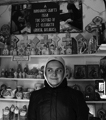FEILE-FESTA
Spring 2011
Poetry
Ancestors
- R. Baldasty
Beloved Albatross
- D. Bastianutti
From Trã Bãn
- K. Cain
The Current (La Corrente)
- L. Calio
Down with the King
- M. Cirelli
May Mass – 1957
- L. Dolan
America
- G. Fagiani
Persephone’s Devotion to Her Mother
- M. Fazio
Bastardu
- V. Fazio
Christmas
- D. Festa
L’Amour, L’Amour on Summer Afternoons
(L’Amour, L’Amour D’estati Filuvespiri)
- M. Frasca
Sgrìob
- S. Jackson
Sirocco
- W.F. Lantry
Little Swift
- R. León
Since You Asked
- M. Lisella
Dublin 2010
- V. Maher
39 Fifth Avenue
- C. Matos
Sunrise in Sicily
- A. O’Donnell
Watching Monzú at Work
- F. Polizzi
L’incontru (Rendezvous)
- N. Provenzano
Propriu Quannu Sta Scurannu (When the Day Is Almost Over)
- N. Provenzano
Bones (Le Ossa)
- D. Pucciani
Things
- E. Swados
Mount Etna
- G. Syverson
Poet Jack Foley Says, “We’re Not Writing for Eternity
- J. Wells
Lord of Winter
- A. Zanelli
FEILE-FESTA
Spring 2011
Prose
Review of Frank Ingrasciotta’s play, BLOOD TYPE RAGU
- L. Calio
Dinner for Three
- D. De Santis
Notes
- A. Guruianu
Review of Carol Bonomo Albright & Christine Palamidessi
Moore’s anthology, AMERICAN WOMAN, ITALIAN STYLE
- R. Holz
Review of Joanna Clapps Herman’s memoir, THE ANARCHIST
BASTARD, GROWING UP ITALIAN IN AMERICA
- R. Holz
Exiles in the Lost World of Italian Food in America. Review of Anthony
Di Renzo’s BITTER GREENS
- M. Lisella
Reverbs
- A. Morazán
The Bearded Woman of Inis Mor
- D. Schummer
Featured Artists
Andy Kover
Richard Holz
BIOGRAPHIES
Contributors
|
Review of Frank Ingrasciotta’s play, Blood Type Ragu Blood Type Ragu, a one-man show by Frank Ingrasciotta, who skillfully acts all 20 characters of his play, was recently shown at the Manhattan Theater Source on McDougal Street in the Village. I was fortunate to attend, along with my 88-year-old Italian American mother. We didn’t stop laughing and weeping along with the audience, from the opening line until the last scene 85 minutes later. This was a work of mastery, where humor almost deceptively carries us through some of the most painful hardships, adjustments and losses an immigrant family faces when they first come to America. Ingrasciotta’s keen ability to pepper his text with Sicilian phrasing and gestures he cleverly translates, allows us all, including non Italians, to fully partake in the world he creates. The author/actor uses a simple bare set and familiar music to conjure the experience of a first generation Sicilian American family in Ridgewood, Brooklyn. From the moment the protagonist walks on stage, we are privy to his story, a universal story of a mother/son, Oedipal complex, played to the accompaniment of a distant and angry patriarchal father transplanted to Brooklyn in the late 60’s and early 70’s. With the clever insight of a Mark Twain, Frank takes us on the family’s journey from Sicily to America and back to Sicily again. He exposes the contrasting worlds of small village life where people still travelled by donkey to a materialistic world filled with fast cars and all types of temptations as well as the demands, hopes, fears and dreams of a brave new world. Language presents a big barrier for his elders; so at 7, Frankie is expected to bridge the gap and speak like an adult to the bank teller or a rep from the telephone company. As he moves back and forth in amazing physical shifts from male to female, child to elder, seamlessly and flawlessly, we develop compassion for his characters who remind us of the familiar phrases we heard growing up in our Sicilian homes, where, as writer, Michael Ventura, aptly said in his powerful essay, “Our Sicilian homes, may have been a hell where what should have been whispered was screamed and what should have been screamed was terrorized into silence." We can recognize universal suffering in the bellicose shouts of the father who feels invisible and slave like, and a mother who no longer has the village women to support her or an extended family to offer wisdom when she alone battles her husband or neighbor. So much is asked of little, “Frenghinè,” we can feel his burdens, hear his longing to please, as well as his terror of engulfment, especially by Mama’s needs. Through many characters, whether a jealous neighbor or long lost relative, we come to appreciate the working class struggle of family when up rooted. The themes of survival, alienation, loneliness, conflict and loss are as old as the traditions of Sicily, but expressed here with a freshness that revives us through the bitter sweet tongue of a playwright who completes the circle of life. Blood Type Ragu will run again in 2011 at the Capitol Theater in Albany during May and June, as well as other venues.
Ventura, Michael, “Homage to Hugo and Antonio” from Letters at 3 AM. Texas: Spring Publications, 1993. 23. |

